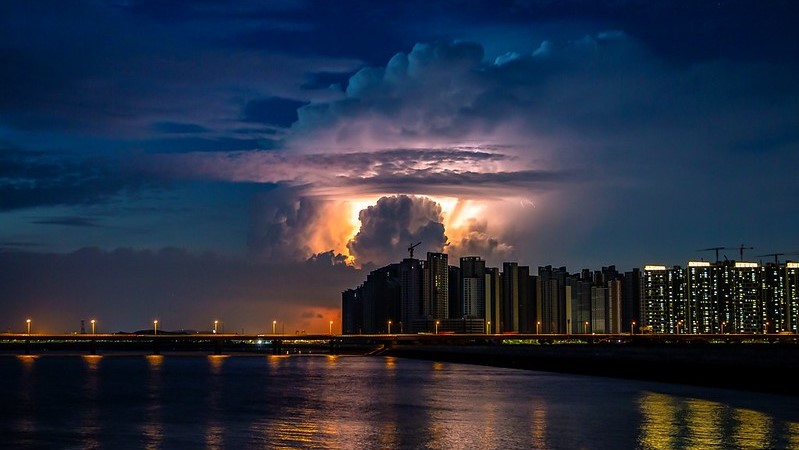The UN’s flagship climate fund has raised $9.3 billion from rich governments to help developing nations go green and protect people from the impacts of climate change – less than in its last replenishment round four years ago.
As contributions from traditional donors flatline, the Green Climate Fund’s new leadership is looking to private sources to make the money stretch.
Japan and Norway were the only major donors to announce new contributions at a pledging conference for the Green Climate Fund (GCF) in Bonn, Germany, on Thursday. They offered less money – in US dollar terms – than in the previous fundraising round in 2019.
Other potential big contributors like Sweden, Italy and Switzerland, flagged their intention to make pledges in the coming weeks, saying they were not yet ready to do so for internal budgetary reasons.
Germany, the United Kingdom and France made pledges ahead of the conference.
The United States, which did not provide any money in 2019 under then-President Donald Trump, failed to announce any contribution citing “ongoing uncertainty in our budget”.
Australia said it would rejoin “with a modest contribution” to the fund from which it had withdrawn under a previous right-wing government in 2018. The exact figure is expected to be announced before the end of the year.
Mafalda Duarte, the Green Climate Fund’s executive director, hailed the fundraising as a “success” during a press conference. Contributors “recognise that addressing the climate crisis is a shared responsibility and that developing nations are not alone in this fight”, she said.
But campaigners told Climate Home News they were disappointed by the pledges. “It is just unacceptable,” said Erika Lennon, who monitors the GCF for the Center for International Environmental Law (CIEL). “The climate crisis has only gotten worse and it is ridiculous countries are not meeting that urgency with the level of finance needed”.
Who is contributing?
A critical financing mechanism of the Paris Agreement, the GCF was set up to channel money needed by poor states to meet their targets to reduce carbon emissions and adjust to the effects of climate change.
It is seeking donations to fund its activities between 2024 and 2027, hoping to exceed the $10 billion it raised in the previous fundraising round four years ago.
UN puts climate ‘course correction’ on Cop28 negotiating table
Germany is set to become the fund’s biggest donor with a €2 billion ($2.2 billion) pledge – 30% higher in US dollar terms than its previous contribution.
It is followed by the United Kingdom with £1.6 billion ($2 billion) – slightly higher than its 2019 pledge – and France with €1.61 billion ($1.75bn), a 4% cut in US dollars given the less favourable exchange rate.
Once the fund’s biggest contributor, Japan has not raised its financial commitment from four years ago, meaning a nearly 19% decrease in real terms.
The US, which is a co-chair of the GCF’s board, has “strong and steadfast confidence” in the fund, according to a statement read out to the attendees in Bonn on behalf of Alexia Latortue, Assistant Secretary for International Trade and Development.
But no financial commitment is forthcoming. “The US is currently working on its announcement but can’t pledge today given ongoing uncertainty in our budget process,” she added.
Joe Thwaites, a senior advocate at the Natural Resources Defense Council, said it was a “missed opportunity”, and there were now “great expectations the Biden administration will make a pledge no later than Cop28”.
Lower ambition
A stagnation in overall contributions may force the GCF to rein in its ambitions.
Current and expected pledges put the fund on course to only marginally exceed $10 billion, which was labelled as a “status quo” or “low” scenario in an internal strategy document seen by Climate Home. That is contrasted with a mid-level target of $12.5 billion and a “high” scenario of $15 billion.
Exposed: carbon offsets linked to high forest loss still on sale
The different levels of ambitions have real-world significance.
In the “status quo” scenario, the bulk of resources would be taken up by projects already in the pipeline – the document says – with new programming only achievable through “significant trade-offs”.
Under a “mid” scenario, the fund plans to extend early warning systems to four more countries, help five million more smallholder farmers and develop climate-friendly food systems and ecosystems.
In the “high” scenario, the fund would help developing countries’ financial systems work towards a green transition and promote clean technology innovation, the document says.
Liane Schalatek from the Heinrich Böll Foundation told Climate Home that this is the “wrong signal” to send with only a few weeks to go before Cop28. “If we are staying at 10 billion it is an effective reduction because of the significant inflation that we have seen since the last fundraising. This is simply not good enough.”
Calls for other money flows
The lack of more commitment from wealthy governments may also deal a blow to the new vision for the fund outlined by Mafalda Duarte less than two weeks ago. The executive director wants the fund to have a capitalisation of $50 billion by 2030, up from $17 billion today.
A key pillar of the plan is the ability to draw in dollars from the private sector. “Public resources will not be enough”, said Duarte on Thursday. “They need to be enablers of a much larger flow of investment.”
Cop28 boss’ appeal to raise climate targets met with total indifference
Major donors are increasingly calling for an expansion to the donor base beyond the countries historically defined as “developed”. Germany pointed the finger, in particular, at the oil-rich Gulf States and China, saying they had a “responsibility” to pitch in with contributions.
“We accept our responsibility and do our fair share,” said federal development minister Svenja Schulze after the conference. “On this basis, we can also ask others to do their fair share too.”
